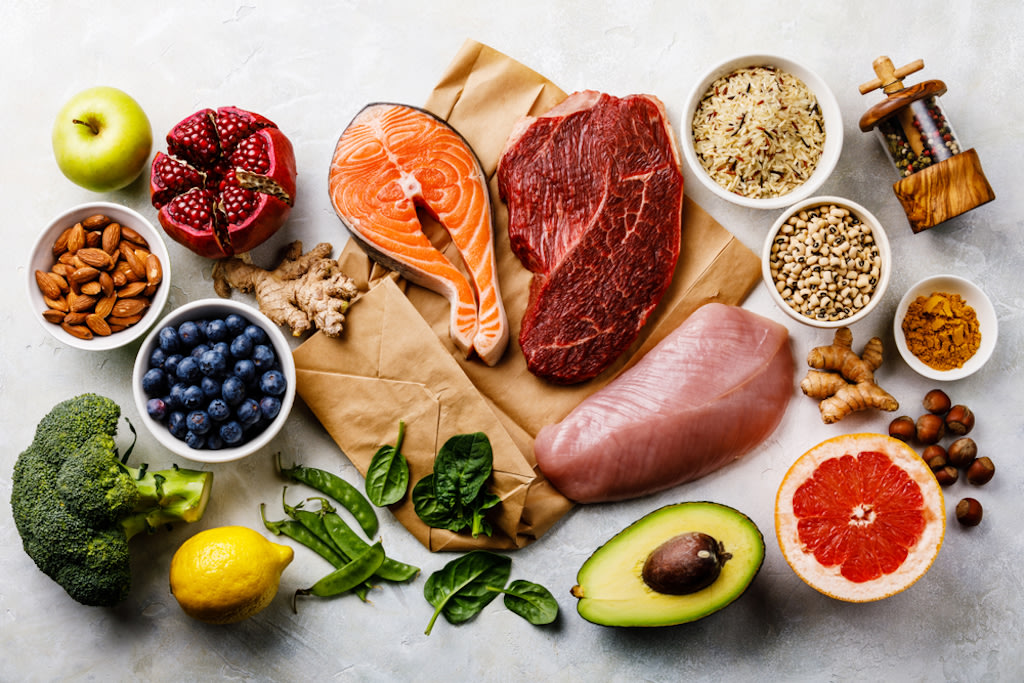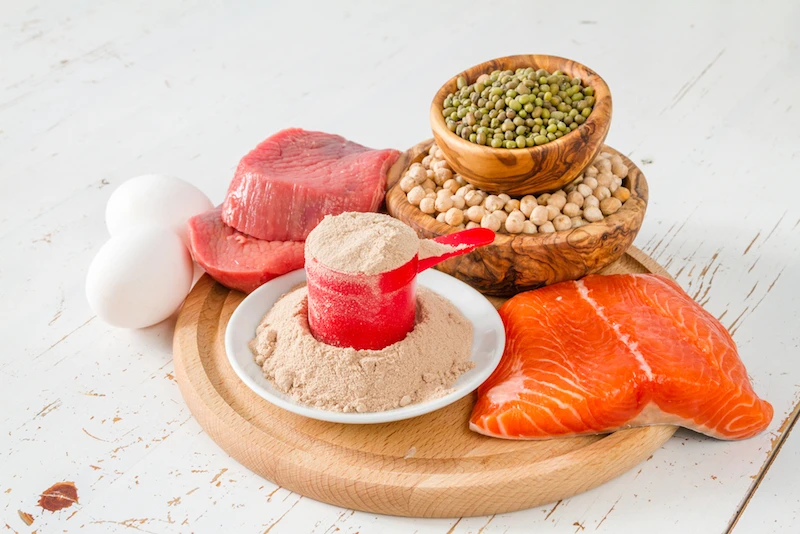Powerbuilding Diet For Muscle Growth

December 9, 2018 - Updated August 26, 2022

For so many years, women’s diet advice focused exclusively on weight loss. While it’s absolutely fine to have this as your goal, it left little room for women with other health and fitness goals to find the information they were looking for. Thankfully, a shift happened along the way and now there are diet tips for almost every type of training and nutrition goal.
While there is no shortage of information if you’re looking to educate yourself when it comes to exercise and your diet, there can also be lots of misinformation and differing opinions out there. If you’re following a Sweat program like BUILD and one of your goals is to increase your muscle mass, you might be looking for nutritional information about a diet that promotes muscle growth, what it can include and why.
If you’re looking for some background on what nutritional choices can help promote muscle growth and complement the weight and strength-focused programs in the Sweat app, read on! We’ll explain how to maximise your performance in the gym and why diet is crucial for the best results.
Diet to promote muscle growth
When it comes to training performance, the importance of your diet shouldn’t be underestimated. It isn’t just important for training – it’s necessary for your recovery as well. If you want to train at your highest capacity and be able to perform consistently, a well-structured diet that promotes muscle growth is crucial.
Consistent across all diets is the importance of understanding macronutrients – or “macros” – and how they can maximise your performance and promote muscle growth. Making sure you’re eating adequate amounts of fat, protein, and carbohydrates will help your performance while training, improve your energy levels throughout the day and promote muscle growth.

Do you need lots of protein to promote muscle growth?
As you probably already know, your body needs protein for muscle building. Protein provides your body with amino acids, which are essential for muscle growth and repair. Muscles are made up of actin and myosin, two filaments that are also proteins. To grow more muscle, you need to increase the amount of actin and myosin by joining more amino acids together inside the muscle. When you eat protein-rich food, you’re providing your body with the amino acids it needs to start this process.
It sounds confusing, but ultimately muscle growth requires protein to help repair your existing muscle and to increase muscle mass (a process known as Muscle Protein Synthesis).
Another thing to consider when you’re lifting weights is that you’re putting your muscles under strain and they need to recover. If you don’t consume enough protein, your body won’t be able to repair the muscle damage caused by your training. Protein intake is important to help you maintain a consistent training schedule but also to reduce your risk of injury from overtraining.
There is also evidence that suggests too much protein can affect fat metabolism – resulting in increases in body fat that may not be in line with your health and fitness goals.
How much protein should you be eating?
We know that for women over the age of 18, in the general population, at least 0.75g of protein per kg of body weight is recommended (0.35g per pound of bodyweight). However, a joint position statement by the Academy of Nutrition and Dietetics, American College of Sports Medicine and Dietitians of Canada in 2016 suggested that if you’re training for muscle growth and strength that protein requirements range from 1.2 to 2.0g of protein per kg of body weight per day (0.55g to 0.9g per pound of bodyweight).
The increase in protein ensures that our muscles have the building blocks they need to repair and grow. Therefore, it’s equally important that we also have enough carbohydrates and fats, to meet our energy needs, so that we’re not using the protein for energy – we’re using it for muscle growth and repair!
What are some quality sources of protein?
Making sure you choose quality protein sources that are easily absorbed by the body and contain all nine essential amino acids is very important.
These foods are considered ‘complete’ proteins and ensure your muscles have the amino acids required to promote muscle growth and repair. These typically come from animal sources such as poultry, fish, eggs, dairy and lean meats.
If you’re following a plant-based diet it may be difficult to have foods that contain all 9 essential amino acids, therefore try to include a good mix of different protein sources in your meals.
Should you take supplements?
Spend a bit of time online or in gyms and you’ll probably notice that supplements are often talked about when it comes to weight training. An article published by the Royal Australian College of General practitioners (RACGP) promotes a food-first approach for recreational athletes trying to meet their nutritional needs. If you can achieve this through whole foods that is the best possible outcome. However, if it isn’t practical for you, then supplementing with something like a protein powder could help you achieve your weight training goals!
Getting started
Just like any other form of training, nutrition should be an important consideration if you're starting strength training or powerbuilding. Hopefully this article has given you a clearer understanding of what to consider when planning a diet that promotes muscle growth.
If you need additional advice regarding a diet to promote muscle growth, or have any other nutrition or diet-related questions, we recommend seeking the advice of a local accredited practising dietitian.

A more empowered you starts with Sweat, and our editorial team is here to bring you the latest fitness tips, trainer recommendations, wellbeing news, nutritional advice, nourishing recipes and free workouts.
* Disclaimer: This blog post is not intended to replace the advice of a medical professional. The above information should not be used to diagnose, treat, or prevent any disease or medical condition. Please consult your doctor before making any changes to your diet, sleep methods, daily activity, or fitness routine. Sweat assumes no responsibility for any personal injury or damage sustained by any recommendations, opinions, or advice given in this article.
Nutrition